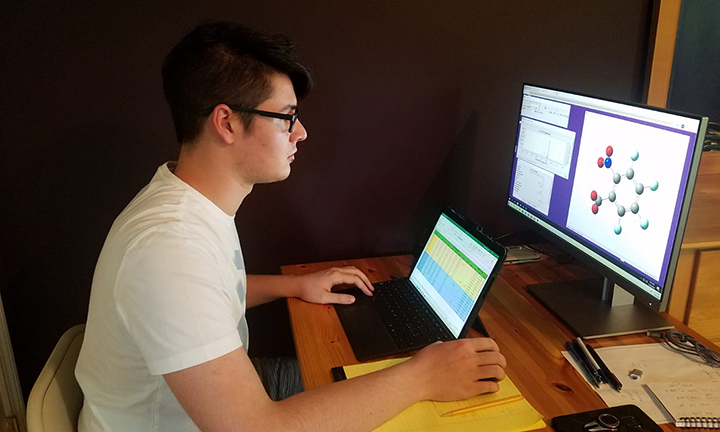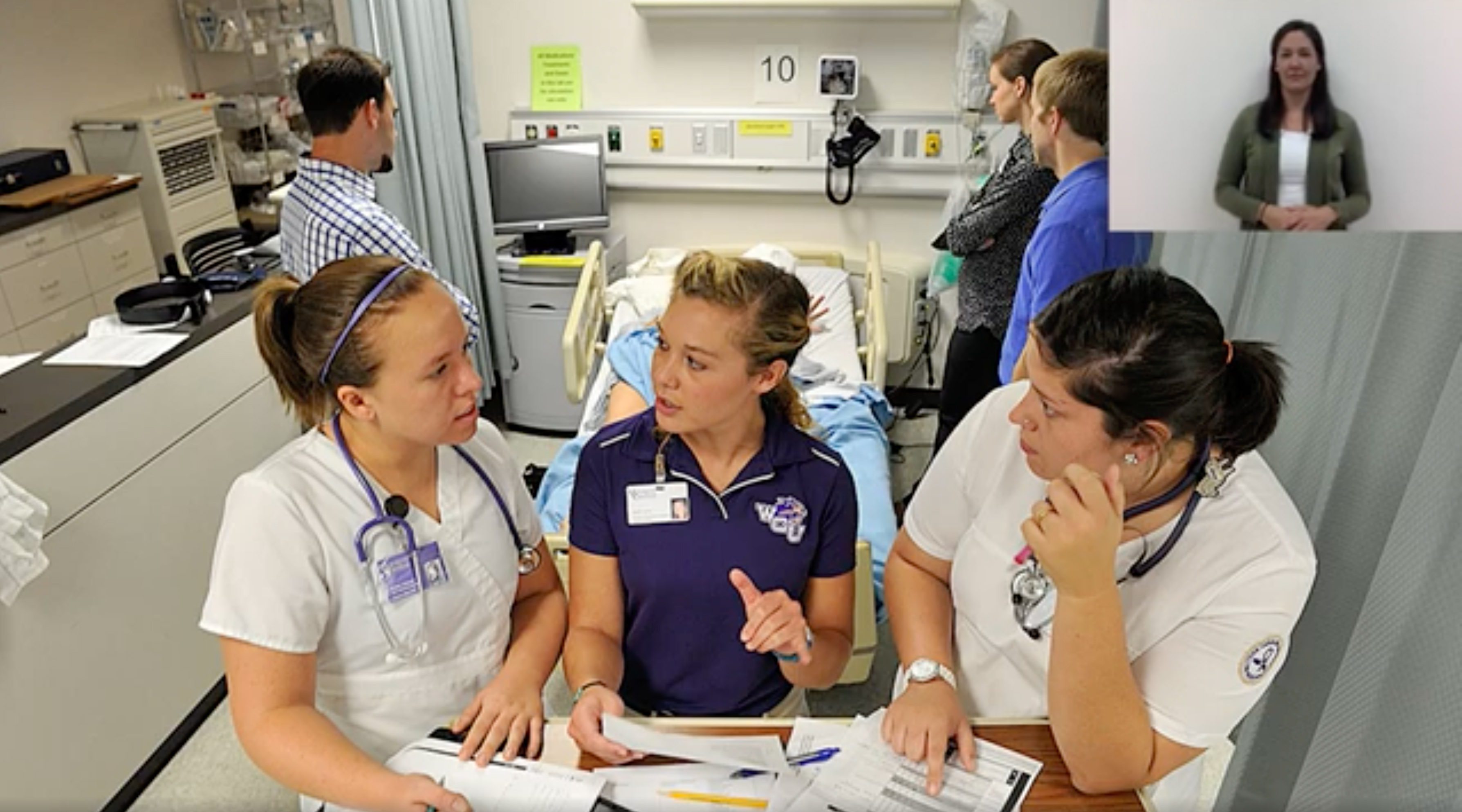Summer Undergraduate Research Program’s digital switch proving successful

The Summer Undergraduate Research Program at Western Carolina University is taking a different approach this year, a recalibration for the times.
Rather than letting COVID-19 precautions be an obstacle, the nationally recognized program instead incorporated digital collaboration as a part of this year’s requirements for project investigations. In the past, selected faculty and students would come together for an eight-week, intensive hands-on, face-to-face session on campus. This year, all WCU summer school classes and programs are online or via another form of distance education course delivery through the end of the second summer term in August, a move made in response to the pandemic.
“The dedication to facilitate academic partnerships and develop outcomes for the 11 research teams remain unchanged from previous years,” said Jill Granger, dean of the Honors College. “The program emphasizes the cross-disciplinary effects of bringing faculty and student scholars together from a wide range of disciplines, the program benefits academically-motivated students through the one-on-one guidance of a faculty mentor and immersive study.”
All the participants receive stipends for their research work, and professional development is available to the students.
The 2020 program is nearing its conclusion, with students and faculty saying they
are fully adjusted to remote access of data and messaging. On Tuesday, July 22, four
of the participating students took an opportunity to make “elevator
speech” presentations to Chancellor Kelli R. Brown and Chief of Staff Melissa Wargo.
“That was amazing, all of you,” said Brown at the conclusion of the Zoom visual and oral reports. “You have met the three-minute thesis and dissertation presentation mark quite well, I think. As many of the faculty researchers in the room know, if you can explain your work to your grandmother, you’ve done a pretty good job with it. You’ve done an outstanding job of doing just that, explaining complex research material in a way someone, like a grandmother, could relate.”
After a round of follow-up questions to the four presenters about their individual research methods, findings and potential project continuations from Brown and Wargo, the chancellor summarized the students’ work as innovative, exciting and professionally delivered.
Condensing a summer’s worth of investigation, fact finding and documentation into three minutes was perhaps the most challenging and rewarding aspect of the program, said Blair Watts, an entrepreneurship major who examined law enforcement techniques in dealing with human trafficking. “It was nerve-wracking and so cool, at the same time,” she said. “Working to hit the highlights of what was most relevant while still including the things I thought are most interesting was a unique challenge and I’m glad I got the chance to experience it.”
For Kat Smith, a forensic anthropology and criminology double major who researched the sexual victimization of female college students, the Q&A was initially daunting. “Responding to inquiries coming from different perspectives of your report was so eye opening,” she said. “I was nervous at first, having to answer questions, it was a totally different experience.”
To make up for opportunities lost from being a residential program, SURP hosted a series of guest speakers to engage and network with the students, as well as share their research experiences and answer questions. “Zoom meetings are held weekly to facilitate a robust community of inquiry,” said Kloo Hansen, undergraduate research coordinator and program director.
“Research is an exercise in patience. There is a grind and you don’t know how it will turn out,” said Jonathan Snover, director of the Western Office of the North Carolina Biotechnology Center and a SURP sponsor, during a recent Zoom session. “Failure is a possibility, so you have to manage expectations. Believe in your goal and build the story as you go.”
Snover explained that all levels of research are important, as he advised teams not to overlook the creative side of research and the importance of many levels of communication. April Tallant, associate dean of the Honors College, took the opportunity during her Zoom session to encourage students to parlay research activities into networking and professional development.
“In the process of your research are utilizing critical thinking, implementing strategies and processing analysis,” Tallant said. “You are building a skill set and gaining information literacy and media interact.”
SURP is an initiative overseen by the Office of the Provost and the Honors College, and open to all WCU undergraduates. To be considered for the program, students interested in participating had to identify a faculty member with whom they wished to collaborate and submit a proposal describing their research project and its goals at the beginning of the academic year. Students selected to participate had their proposals reviewed by a committee of faculty representatives from each college on campus.
Support for SURP comes from the North Carolina Biotechnology Center and WCU’s Center for the Study of Free Enterprise, Rapid Center, Office of the Chancellor and Office of the Provost, as well as many of the individual colleges at the university and private donations. The program is recognized for allowing undergraduate students and their faculty mentors to conduct in-depth, original research and make formal presentations during an annual symposium, which may be restructured for a digital forum, as well.
The undergraduate researchers, their coursework, faculty mentors and project titles are:
- Anastasia Hillsgrove, psychology, with Windy Gordon, assistant professor of psychology, on “Mortality Salience vs. Self-Esteem Enhancement and Attitudes Toward the Poor”
- Matthew Rous, Cherokee studies, with Rainy Brake, Cherokee language instructor, on “A Proposal to Investigate Cherokee Ethnobotany through the Lens of Linguistic and Anthropological Studies”
- Barnes Powell, history, with Sara Snyder Hopkins, assistant professor of anthropology and sociology, on “Cultural Landscape Mapping in the Cherokee Homeland”
- Sarah Wallace, marketing, with Marco Lam, associate professor of accounting, on “Corporate Social Responsibility: Do Investors and Consumers Really Care? Evidence from the BP Oil Spill”
- Blair Watts, entrepreneurship, with Bethany Davidson, assistant professor of entrepreneurship, on “Overcoming Barriers with Human Trafficking Prevention Programs in Police Departments”
- Daniel Hammer, mathematics, with William Kreahling, associate professor of mathematics and computer science, on “An Exploration into the Conversion of C Libraries to Rust”
- Katelyn Smith, forensic anthropology, with Tasha Youstin, assistant professor of criminology and criminal justice, on “The Impact of Childhood Parental Ideology on the Development of Emphasized Femininity and Subsequent Sexual Victimization in Female College Students”
- Charles Wise, chemistry, with Amanda Storm, assistant professor of biology, on “Investigating an unknown protein in Staphylococcus aureus”
- Justin Clifton, mathematics, with Mark Budden, associate professor of mathematics and computer science, on “Optimizing Hypergraph Colorings”
- Matteo Fratarcangeli, physics, with Channa De Silva, associate professor of chemistry, on “Development of Europium (III) Metal-Based Calcium Fluoride Nanoparticles for Potential
Biomedical Imaging of Human Live Cells”
Thomas Meek, computer science, with Mark Budden, associate professor of mathematics and computer science, on “An Algebraic Approach to Hypergraph Lifting”
For more information about the Summer Undergraduate Research Program (SURP), contact Kloo Hansen at 828.227.2010 or kchansen@wcu.edu.

